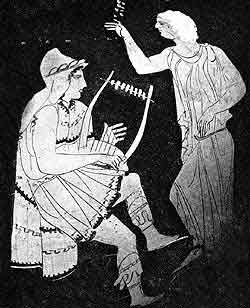Life: 496B.C.--406 B.C.
He was born to a wealthy family in the Athenian suburb of Colonus. As an adolescent he was known for his looks and the beauty of his voice. He performed the victory paean in the Theatre of Dionysos after the victory at Salamis in 480 B.C. He was a famous dancer. He counted Aeschylus, Euripides, Pericles, Herodotus, and Socrates as his friends and Pericles was choregos or producer of many of his plays. It is said of him that when he heard of the death of Euripides, he dressed himself and his chorus in black at the dramatic festival. His two sons also became tragedians. He was a general and a priest of Aesclepius, the god of healing, whose cult in later times is closely associated with the theatre (Epidauros, Athens, Pergamon). He successfully defended himself in his old age against the charge of senility by reading a choral hymn to Athens from his last play, Oedipus at Colonus.
Sophocles wrote over 100 plays and won 18 first place victories and 24 second places. His innovations in theatre include the introduction of the third actor, the development of scenery, and the abandonment of the trilogy form. He was the philosopher, Aristotle's favorite playwright. Many of the concepts expressed in Aristotle's Poetics are based on the techniques of Sophocles, particularly in Oedipus the King.
Surviving plays:
441 B.C. Antigone
409 B.C. Philoctetes
401 B.C. Oedipus at Colonus
Undated works: Ajax, Oedipus the King, Electra, Trachiniae, Ichneutae (a fragment of a satyr play)

Sophocles as Thamyrus(left) in his tragedy, Thamyrus, with Euaion son of Aeschylus in the role of Argiope(right)
